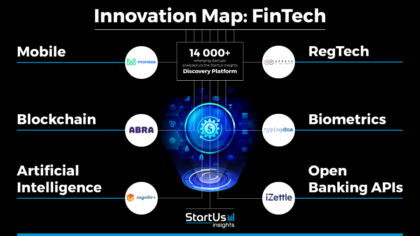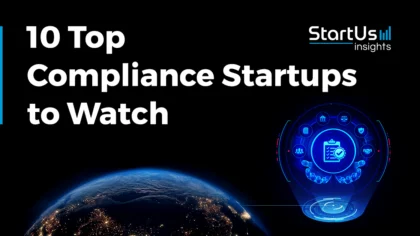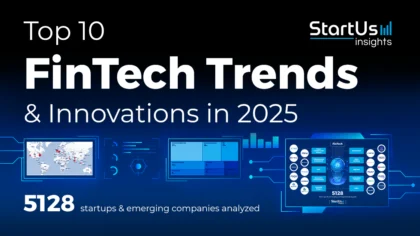Accelerate Productivity in 2025
Reignite Growth Despite the Global Slowdown
By the end of 2017, there were more than 30 FinTech Unicorns globally, including European companies such as Klarna, Adyen, and Transferwise. It is not surprising that established banks are seeking to partner with FinTech startups to reinvent their business models: in H1 2024, USD 15.9 billion was invested in FinTech worldwide. To give you a scale of activity in the industry, we present you the FinTech Innovation Map.
This article was last updated in July 2024.
Dive into Our Data-driven FinTech Innovation Map
At StartUs Insights, we focus on technology and innovation scouting to identify the rising stars and innovation areas in the industry early on. Through a large-scale analysis of 14 000 FinTech startups, the FinTech Innovation Map lays out technologies that will cause major disruptions in the financial industry in the near future.
Ready to explore all 14000+ FinTech Startups & Scaleups?
Mobile Banking
Mobile banking has come a long way from SMS Banking, which first appeared in 1999. Today, smartphone banking apps allow for mobile payment and management of all banking and financial services on the go. Not only does mobile banking reduce location dependency on financial services and operation costs, but it also provides an end-user interface for the expansion of Banking-as-a-Platform (BaaP).
Blockchain
A cryptocurrency frenzy over the past two years is how most people got introduced to the blockchain. Aside from using cryptocurrencies for private and fast online transactions, blockchain provides an immutable ledger. This enables transparent, secure, and reliable documentation of contracts, transactions, and records. Innovations such as Blockchain Bonds, blockchain clearing, and settlement systems have already been used to make intra-bank and inter-bank transactions cheaper and faster.
Big Data
In addition to traditional financial data collection, FinTech startups are collecting data from new sources. Open banking platforms and the Internet of Things (IoT) devices provide an additional layer of data. Combined with Artificial Intelligence, big data analytics utilize large amounts of old and new data to discover hidden patterns for better risk management and fraud detection. These insights improve the understanding of customer behaviors and allow banks to create improved and customized products and services.
Artificial Intelligence (AI)
AI helps banks to analyze their Big Data to improve existing solutions and make better decisions. Startups use cognitive AI to go through a large amount of unstructured text and data. For financial institutions, this generates valuable insights from loads of data. A more intelligent AI chatbot or virtual assistant can take over repetitive “low-value” operations, such as performing small amounts of transactions, explaining financial products, and providing basic financial advice to customers.
Looking for specific FinTech Innovation Trends?
Regulatory Technology (RegTech)
Most RegTechs are services and tools using Big Data and Cloud Computing to enhance a company’s ability to monitor, report, and comply with regulatory requirements. These startups use AI and predictive analytics to automate compliance tasks, reduce risk fraud, and perfect authentication and identity management. Global banking regulations are becoming ever-complex to tackle cybercrime and other sophisticated threats. RegTechs enable banks to increase transparency and consistency while lowering the cost of compliance.
Biometrics
Biometric technologies are often seen as the holy grail of data safety and security. They use physically unique features of an individual, including fingerprints, face, voice, retina, and other forms of recognition to enhance security and identity verification. With biometric devices, banks are able to safeguard their users and prevent cybercrime, and identity theft better than ever.
Open Banking
Among these innovation areas, open Banking may have the largest disruptive impact on the traditional banking model. Through open APIs, banks provide more transparency and access to banking data and encourage the creation of new value chains and services. Until recently, Banking-as-a-Service (BaaS) was seen as the main model of how FinTech startups leverage Open APIs. Startups use these platforms to create new services and products that improve the banking experience for consumers and generate value. Banking-as-a-Platform (BaaP) is an emerging next Open API model. It enables banks to provide curated third-party different financial services and products to customers. Moreover, it allows banks to retain control of customer data and ensure the quality of services provided on their platform.
Disruptive Startups In The FinTech Industry
Monese
A complete mobile banking company that significantly simplifies the process of opening a bank account in the UK (“instant account for mobile people”). It enables users to send money abroad, receive transfers, and pay bills simply from their smartphones.
Abra
Having raised roughly 12€ million to date, the startup takes full advantage of blockchain technology to merge money transfer and payments by a digital cash wallet that works worldwide. No bank or other traditional organization is participating in managing, storing, sending, or accepting funds. The startup enables the purchase and storage of digital currency like Bitcoin directly on the smartphone.
Cognitiv+
A French startup, Cognitiv+ builds an Artificial Intelligence engine capable. Its engine identifies topics of interest in unstructured text as well as relationships between topics, companies, and more. For financial institutions, AI can be used to gain quick and thorough insights into their legal documents by analyzing data from legislation and contracts.
Aereve
Hong Kong startup Aereve leverages AI-driven natural language processing to enhance anti-money laundering (AML) and know-your-customer (KYC) compliance. The startup’s products, E2AML and E2KYC, focus on improving name and transaction screening. While E2KYC ensures adherence to standard compliance measures, E2AML goes beyond by analyzing names across multiple languages within AML systems. This reduces false positives, avoiding the pitfalls of traditional transliteration methods.
iZettle
This Swedish startup counts as one of the front-runners enabling payment via smartphone, tablet, and the web. The functionalities of this startup’s solution are available to developers, also allowing them to integrate it with their own, thus creating new apps and services.
TypingDNA
By predicting a user’s identity by their typing pattern, this startup takes the application of biometrics in FinTech further. Their ambition is to use biometric typing, also known as keystroke dynamics, to protect ePayments, SaaS, apps, and devices. Developers can secure an application simply by typing biometrics through their application program interface (API).
What’s Next for the FinTech?
The financial industry has already experienced many changes and disruptions caused by FinTechs. Technologies such as open banking, mobile payment, and biometrics have changed how many consumers interact with their banks. Blockchain and cryptocurrencies have become a known phenomenon in recent years, but their real disruption potential in the financial industry has yet to be seized.
Other FinTechs in the areas of BaaP, RegTech, Big Data, and AI will bring fundamental change to how banks operate. Traditional banks need to move fast in order to adapt to the next wave of disruption. Here at StartUs Insights, we provide comprehensive analysis and actionable innovation intelligence that facilitates the collaboration between FinTech startups and our clients so that they can stay ahead of their competition.









